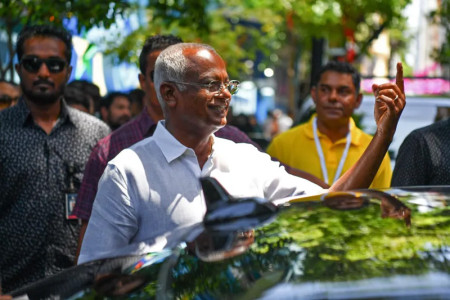The vote on Saturday is being closely watched by India and China, both of whom are vying for influence in the Indian Ocean tourist destination.
With nearly all ballots counted, preliminary results showed the mayor of the capital Male, Mohamed Muizzu, winning 46 percent of the vote, while Solih had 39 percent
Neither cleared the 50 percent threshold required to avoid a second round.
Muizzu, 45, contested the election promising to limit India’s presence in the Maldives, including by expelling a small group of Indian military personnel stationed in the archipelago. His Progressive Party of the Maldives (PPM)-led coalition had drawn the Maldives closer to China while in power from 2013-2018, signing onto Beijing’s Belt and Road Initiative and obtaining millions of dollars in loans to fund key infrastructure projects.
Solih, 61, who won the last election in 2018 in a landslide amid widespread public outrage over corruption and rights abuses under PPM, returned the Maldives firmly into India’s orbit. He championed an “India-first” policy and secured similar amounts of funding from New Delhi to scale up infrastructure, including building housing and bridges in the Male region.
Polls ahead of Saturday’s vote consistently showed Solih leading the crowded field of eight candidates but infighting within his Maldivian Democratic Party (MDP), a lower-than-expected voter turnout and disenchantment with his failure to tackle corruption appears to have hurt the president.
The run-off between Muizzu and Solih is expected on September 30.
“We are very happy today. The Maldivian people have come out, in the nationalist spirit, and shown a great example, despite government pressure and harassment,” Muizzu told reporters following his triumph.
DN


